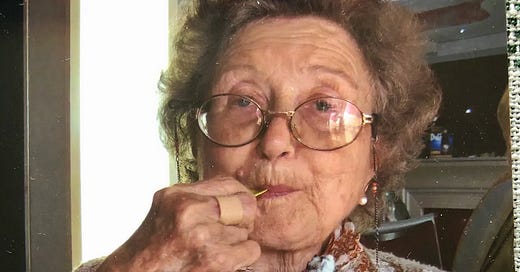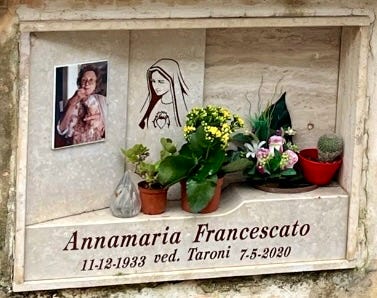My aunt, the last person in Italy not to have a cell phone, died five years ago this month at the age of 86. This is the photo she wanted on her tombstone.
I took the photo in September 2009, the last time I saw her in person, when Rafael and I visited her as part of our Italian honeymoon. This was how my aunt wanted to be remembered.
What do we leave behind when we die?
Other than living through some stuff — including growing up in the Piazza del Duomo in Milan during World War II — my aunt led an unremarkable life. She never had children, didn’t pursue anything you could call a career, left no lasting imprint that can be seen.
Yet she had a strong presence — one that I can readily summon, although I didn’t grow up with her as a constant presence and hadn’t seen her for so many years. A perennially cheerful person despite the hardships she encountered, she provided a positive example of how to move through the world. Enjoying her ice cream.
Outlines of a life
Tia Annamaria was born and raised in Italy, but the family lived in Argentina for a while starting when my father, her older brother, was 18. That meant my sister and I could speak to her in Spanish, our first language, so we called her Tia rather than Zia.
Though she lived an ocean and hundreds of miles of land away from our home in Urbana, Illinois, we were lucky to spend chunks of time with Tia Annamaria now and then when we were growing up. Our parents had August off from their university jobs and sometimes took the family to Italy; some of those times they’d leave us with Annamaria and our grandparents for extended periods while they traveled farther afield.
When we first traveled to Italy, our grandparents had a seaside hotel in Uruguay that they’d run in the South American summers (Hotel Milano is still there!), returning to Italy for Italian summers. Around 1970 they built a summer house in the Dolomites designed by my father, where we visited them and Annamaria a number of times.
We were also lucky to spend some time in the little town of Carate Urio on Lake Como, where Tia Annamaria lived when she was married, somewhat briefly, to Eutichio Taroni. He was an older man who seemed ancient to my 14-year-old self, as reflected in this diary entry: May 15, 1976: Here we are at the Lago di Como, at the home of Father’s dear sister and her even dearer husband, who is only about 257 years old.
Despite my rather scornful teenage attitude, we enjoyed visiting Tia Annamaria and Eutichio. We’d gather chestnuts on the hills among the roaming goats and roast them in the fireplace. I’d spend hours gazing out Annamaria and Eutichio’s large French windows at the lake, we’d take in a multitude of other breathtaking views as Father drove our rental stick shift around the “curve brute” (nasty curves on the winding mountainous roads), and we’d dine out at restaurants stratospherically better than anything you could imagine in 1970s central Illinois, frequented by locals, where the owners would give my aunt scraps of meat for her cats. She always had a few cats around, which we loved playing with and watching as they hunted mice.
When Eutichio died, my aunt had to leave their house, which his family owned, and she let my grandmother, also widowed, persuade (or bully?) her to move with her to Fano, a town in the Marche region of Italy, where they could afford their own house. She didn’t love it there — though with her usual equanimity, she made the best of it. She’d preferred her friends in Carate Urio and told Rafael and me that an old dictionary — “It’s as old as I am!” — defined people from the Marche region as liars, traitors, and thieves.
But it was there that she met Alberto, a guy whose upbeat nature matched hers and who told us she was the love of his life. Sadly, she never moved in with him because my grandmother didn’t like him. When the film Like Water for Chocolate came out, Annamaria compared her life to that of the protagonist, controlled by the mother she had to care for and separated from her love — yet somehow, my aunt’s life never felt tragic.
Tia Annamaria was one of those people who are born with a happy disposition. If you know me, you know that means we were different. She was also different from her brother, who was more intellectually inclined and became a professor; Annamaria would fall asleep during sessions with the tutor her parents hired to help with her studies. She and Nonna read magazines like Grazia, a sort of cross between Cosmo and Good Housekeeping, and followed whatever latest health recommendations they’d seen there. My parents looked down on this habit, and I certainly couldn’t relate to Annamaria’s tendency to indulge for hours in the only low-quality thing produced in Italy, Italian TV (well, that and fette biscottate, a dry, crunchy toast that Rafael describes as having negative flavor).
Still, I wish I’d gotten Annamaria’s happy genes! That’s not to say she never complained — and she had plenty to complain about besides the people of the Marche and her inability to live with Alberto, including a serious case of rheumatoid arthritis that plagued her for years. But I know people who complain a lot more over a lot less. She still enjoyed her ice cream.
What’s left from a life
Toward the end of her life, I managed to have a few WhatsApp video chats with Tia Annamaria thanks to her devoted Latin American caregiver Nieves, who, unlike her, had a smartphone. Score one for modern technology! The last WhatsApp call was during quarantine, and the first thing Annamaria asked me was if we had coronavirus over here. Then she told me I was looking good, unlike the previous time we’d talked. I cracked up as Nieves, who was standing to the side, said, “Why are you telling her that?”
I was just glad we could talk and laugh.
When I think of Tia Annamaria, laughter and joy is what sticks with me. And I think about all the things each person we know leaves with us — whether or not they leave a legacy — and how all those ways they touched us linger and live on in both us and everyone we touch … maybe in an endless chain of influence.
Annamaria, along with Nonna, taught me to crochet and knit; I later made mittens for a friend and a baby sweater for a baby who’s now in her 30s and has her own kid. The bit of money she left us helped me buy an electric car and take an EV road trip, the impetus for starting Flower Child, and redo our backyard so more friends can gather there, part of my effort to create more community.
Most important, she gave me an example of how to live well. I’ve suggested before that we might be happier worrying less about leaving a legacy and focusing more on living a good life now. Tia Annamaria embodied that, and I hope I can remember her lesson.
What legacies have people left in your life? Have any of them surprised you?









This is so beautiful, Rosana! I love the attention to detail and the honoring of the little things in life, which make up the environment we live in. You tia sounds like a lovely person to have had in your life, and I'm happy for both of you.
Rosana, I loved reading this. Your aunt's picture, eating the ice cream, was the best example of finding happiness in small everyday things. You've made her a lovely memory for me, thinking of her, and your father, and their childhood. And you've made excellent points. Finally, I laughed and I cried (but laughed more) while reading this wonderful memory you have shared with us. Thank you so very much!!
And it made me think of my mother's sister, who had an amazing, strange, and funny life. She was my first model of a strong woman, in a world that didn't know what to do with them. She graduated with a Ph.D from the U of Illinois long, long ago. And shortly thereafter was running around Europe with a European boy friend who had a motorcycle which they rode everywhere. She taught me how to eat an artichoke (I'd never even seen one before) and how to eat a lobster. How wonderful. And, she, second to my mother, showed me how to be independent and have fun, and to do my best to do no harm. Your memory of your aunt, is now shared with me, and it has brought back other wonderful (and crazy and funny) memories of my aunt! Thank you again!